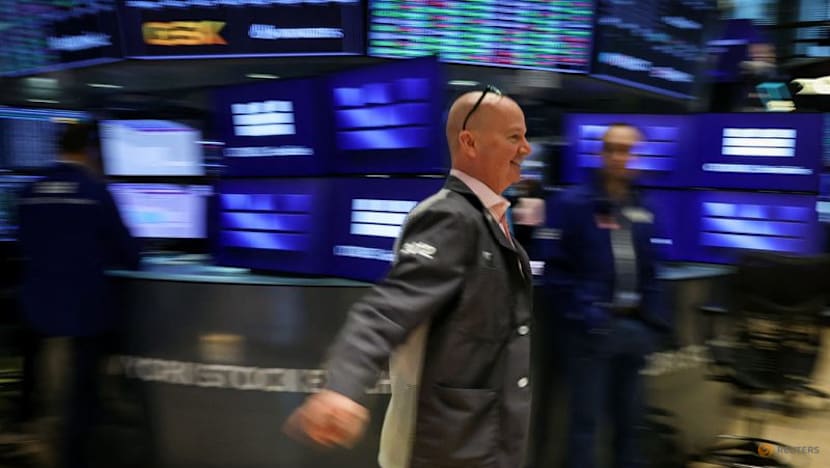Equities rise modestly, US bond yields dip with government reopen, interest rates in focus

Traders work on the floor at the New York Stock Exchange (NYSE) in New York City, U.S., November 10, 2025. REUTERS/Brendan McDermid
NEW YORK/LONDON :MSCI's global equities index rose slightly on Wednesday while U.S. Treasury yields fell and Wall Street indexes were mixed while investors waited for U.S. Congress to end the federal shutdown and provide greater clarity on the health of the U.S. economy.
In currencies, the dollar dipped against the euro but gained against the yen, which fell to nine-month lows. U.S. Treasury prices rose in anticipation of Federal Reserve rate cuts after weak data and central banker comments.
Investors were awaiting a Wednesday evening vote in the Republican-controlled House of Representatives to restore funding to government agencies and end the 43-day shutdown. The Senate voted on Monday to end the longest-ever U.S. government closure, which disrupted food benefits for millions, left hundreds of thousands of federal workers unpaid, snarled air traffic, and paused crucial economic data releases.
While investors have been hopeful that a reopening would allow the resumption of data releases, the White House said October jobs and inflation data reports might never be released due to the shutdown.
The Dow rose to a record closing high while the S&P 500 barely rose and the Nasdaq fell as investors sold off some highly valued heavyweight technology stocks in favor of value stocks.
"People are feeling better about taking a little bit more risk. Money is flowing to some parts of the market that have been underperforming," said Irene Tunkel, chief U.S. equity strategist at BCA Research.
In particular, airline stocks helped push the Dow Jones Transportation average up 0.8 per cent on hopes air travel, which has suffered cancellations and delays, would return to normal after the reopening, when crucial airport workers such as air traffic controllers will start getting paid again.
BOSTIC ANNOUNCES RETIREMENT
On Wall Street, the Dow Jones Industrial Average rose 326.86 points, or 0.68 per cent, to 48,254.82 for its second record close in a row. The S&P 500 rose 4.31 points, or 0.06 per cent, to 6,850.92 and the Nasdaq Composite fell 61.84 points, or 0.26 per cent, to 23,406.46.
MSCI's gauge of stocks across the globe rose 2.59 points, or 0.26 per cent, to 1,011.78. Earlier, the pan-European STOXX 600 index closed up 0.7 per cent, while Europe's broad FTSEurofirst 300 index ended up close to 0.8 per cent with both hitting record highs, led by banks.
The S&P 500 value index rose 0.4 per cent, while its growth counterpart lost 0.2 per cent. U.S. banks, a large part of the value index, were among Wall Street's best performers as investors focused on the prospect of rate cuts and government reopening.
"The Fed is cutting rates, so that's probably a positive for banks and since the shutdown is likely over it means that economic activity will limp back to normalcy," said John Praveen, managing director at Paleo Leon in Princeton, New Jersey.
After the bond market closure on Tuesday for the Veterans Day holiday, U.S. Treasury prices rallied on Wednesday, driving yields lower as investors bet on further Fed rate cuts after Tuesday's weekly jobs data from ADP, which showed that U.S. private employers shed jobs in the four weeks ending on October 25.
Atlanta Federal Reserve President Raphael Bostic said he would retire in late February. Since Bostic had voiced concerns about high inflation and was cautious about rate cuts, BCA's Tunkel said investors may expect a more dovish replacement, since the White House favors lower rates. The U.S. president does not select regional Fed presidents but appointments are approved by the Fed's Board of Governors, which President Donald Trump is trying to reshape.
Tunkel also pointed to New York Federal Reserve President John Williams' reiteration that the time is getting closer for a U.S. central bank restart of bond purchases as part of its effort to maintain control over short-term rates.
The yield on benchmark U.S. 10-year notes fell 4.5 basis points to 4.065 per cent, from 4.11 per cent late on Monday while the 30-year bond yield fell 4.1 basis points to 4.6608 per cent.
The 2-year note yield, which typically moves in step with interest rate expectations for the Federal Reserve, fell 2.3 basis points to 3.568 per cent.
In currencies, the U.S. dollar gained against the euro and the yen as traders evaluated what a flood of economic releases will mean for Fed rate policy if the government votes to reopen, as is expected.
The dollar index, which measures the greenback against a basket of currencies including the yen and the euro, rose 0.08 per cent to 99.52, with the euro up 0.05 per cent at $1.1586.
Against the Japanese yen, the dollar strengthened 0.44 per cent to 154.83.
The yen's decline to nine-month lows had prompted concern in Tokyo, with Finance Minister Satsuki Katayama saying she would not deny that negative economic impacts from the weak yen have become more pronounced.
Oil prices tumbled more than $2 per barrel on oversupply concerns as OPEC said global oil supply will match demand in 2026, marking a further shift from its earlier projections of a supply deficit.
U.S. crude settled down 4.2 per cent, or $2.55 at $58.49 a barrel and Brent settled at $62.71 per barrel, down 3.8 per cent, or $2.45, on the day.
Gold prices rose ahead of the House vote on the government reopening in anticipation of economic data that could set the stage for a December rate cut.
Spot gold rose 1.74 per cent to $4,198.33 an ounce. U.S. gold futures rose 1.98 per cent to $4,188.10 an ounce.













